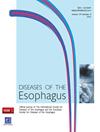624.食管鳞状细胞癌的新辅助化疗后食管切除术与确定性质子束疗法的长期疗效比较
IF 2.3
3区 医学
Q3 GASTROENTEROLOGY & HEPATOLOGY
引用次数: 0
摘要
背景 质子射线疗法(PBT)治疗食管鳞状细胞癌(ESCC)是一种很有希望避免手术的可治愈疗法,但其长期疗效尚未得到充分报道。在此,我们比较了 PBT 与新辅助化疗后食管切除术的生存效果,新辅助化疗是日本的标准治疗方法。方法 从本研究所的数据库中找出 2011 年至 2020 年期间接受新辅助化疗加根治性切除术和质子束治疗的临床 II 期或 III 期胸部 ESCC 患者。化疗方案为5FU、CDDP(CF)联合/不联合多西他赛。质子束治疗的定义是对原发肿瘤进行 50 GyE 或以上的照射、预防性照射和同期化疗(CF)。患有其他严重疾病的患者和无法进行随访的患者被排除在外。为了调整混杂因素,我们进行了倾向评分匹配;协变量包括T因子和N因子、年龄、性别、治疗时间和肿瘤部位。我们对手术组和 PBT 组的总生存时间进行了回顾性评估,并将其作为本研究的主要结果。结果 从数据库中筛选出 244 名患者。中位年龄为 71 岁,209 人为男性,102 人在化疗后进行了食管切除术,142 人进行了 PBT。经过倾向得分匹配后,每组选出 46 名患者。手术组和 PBT 组的中位生存期分别为 42.8 个月:44.6 个月(P=0.784)。无治疗相关死亡病例,分别有 8 名和 8 名患者出现 3 级或以上不良反应(P=1.00)。结论 在长期疗效和不良反应方面,PBT 治疗 II 期和 III 期 ESCC 与新辅助化疗后手术治疗效果相当。本文章由计算机程序翻译,如有差异,请以英文原文为准。
624. LONG-TERM OUTCOME OF NEOADJUVANT CHEMOTHERAPY FOLLOWED BY ESOPHAGECTOMY VERSUS DEFINITIVE PROTON BEAM THERAPY FOR ESOPHAGEAL SQUAMOUS CELL CARCINOMA
Background Proton beam therapy (PBT) for esophageal squamous cell carcinoma (ESCC) is a promising curable treatment to avoid surgery, however the long-term outcomes have not enough been reported. Herein, we compared the survival outcomes of PBT with those of esophagectomy after neoadjuvant chemotherapy, which is the standard of care in Japan. Methods Patients with thoracic ESCC, clinical stage II or III, who underwent neoadjuvant chemotherapy plus radical resection and proton beam therapy between 2011 and 2020 were identified from database of our institute. The chemotherapy regimen was 5FU, CDDP (CF) with/without docetaxel. PBT was defined as irradiation of 50 GyE or more to the primary tumor, prophylactic irradiation, and concurrent chemotherapy (CF). Patients with other severe diseases and patients who could not be followed up were excluded. To adjust confounding factors, propensity score matching was performed; covariates included T and N-factor, age, gender, time of treatment and site of tumor. We retrospectively evaluated overall survival time of the surgery and PBT groups as primary outcome in this study. Results 244 patients were selected from the database. Median age was 71 years, 209 were male, 102 had esophagectomy after chemotherapy, and 142 had PBT. After propensity score matching, 46 patients in each group were selected by propensity score matching. Median survival was 42.8:44.6 months in the surgery and PBT groups, respectively (p=0.784). There were no treatment-related deaths, and Grade 3 or higher adverse events occurred in 8 and 8 patients (p=1.00), respectively. Conclusion PBT for stages II and III ESCC was comparable to neoadjuvant chemotherapy followed by surgery in long-term outcomes and adverse events.
求助全文
通过发布文献求助,成功后即可免费获取论文全文。
去求助
来源期刊

Diseases of the Esophagus
医学-胃肠肝病学
CiteScore
5.30
自引率
7.70%
发文量
568
审稿时长
6 months
期刊介绍:
Diseases of the Esophagus covers all aspects of the esophagus - etiology, investigation and diagnosis, and both medical and surgical treatment.
 求助内容:
求助内容: 应助结果提醒方式:
应助结果提醒方式:


